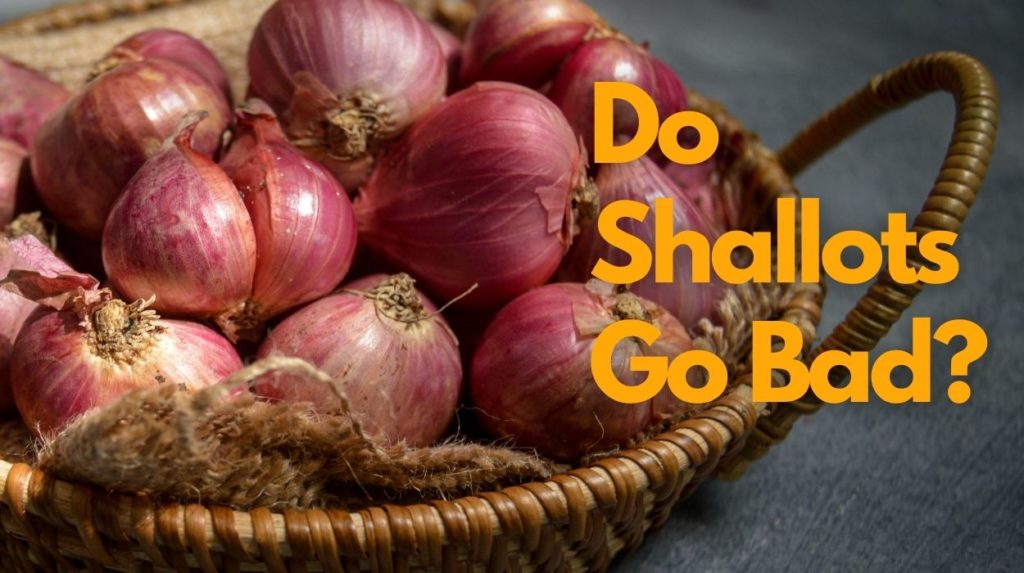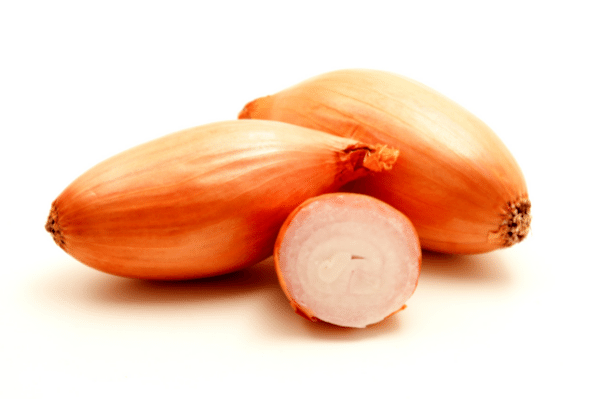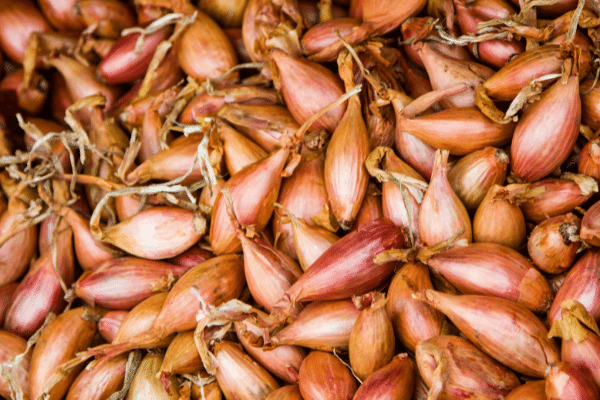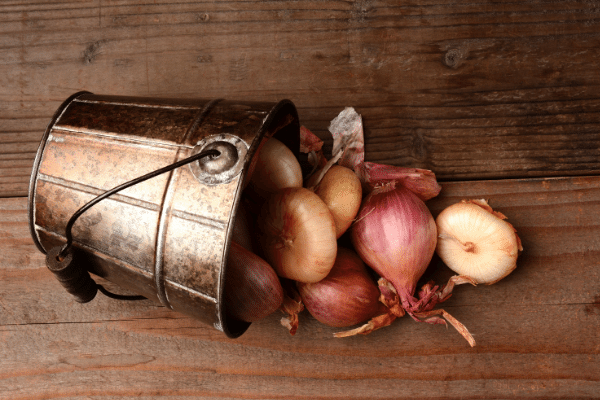
You know how important onions are to cooking, right? Well, they share the same quality and relevance with their siblings- shallots. Chopped or sliced, this vegetable works as a reliable addition to salsas, salads, marinades, vinaigrettes, casseroles, soups, etc. But does this vegetable have the same shelf life as its siblings?
Just like onions, shallots do go bad after a point in time. In the absence of storage techniques, it will go bad after and lose its sweet yet sharp taste.
So, how should you store it? How to determine whether your shallots have degraded in quality? The following article will answer such questions. So if you are curious about the shelf life of shallots and their ideal storage methods, let’s deep dive quickly!
How Long Do Shallots Last?

If you plan to bring home a healthy big bunch of Shallots on your next visit to the supermarket, you must learn how long it lasts before sticking it in your pantry. The shelf life of the Shallots depends on the storage conditions, and temperature plays a crucial role in keeping them fresh.
How long do shallots last in the pantry?
If the Shallots are stored at room temperature or below, they may last up to 30 days. But, if you reside in high temperature and humid areas, the shelf life will reduce to two weeks or even less.
How long do Shallots last in the fridge?
Shallots that are refrigerated tend to last up to six months. But, two months is a more realistic and safer period. Keeping them for long is not recommended.
However, people who are preparing their shallots ahead of time can store them in a refrigerator. It means they can prepare the shallots on the weekends and consume them all through the week without issues.
| Items | Pantry | Fridge | Freezer |
| Raw and Fresh Shallots | One Month | Two Months | Two-Three Months |
| Peeled Shallots | Ten Days | One-Two Months | Two Months |
| Diced Shallots | 24 Hours | Seven to Ten Days | 15-20 Days |
These periods are just the estimates.
Pro Tips!
- Shallots must not be stored in damp and high-temperature places as it accelerates the spoilage process and makes them rot faster.
- Avoid storing it with other vegetables as it tends to spoil other vegetables in the tray.
How Can You Tell if Shallots Are Bad?

Wondering how to identify if your shallots have gone off or not? Well, here are a few easy signs that can help you know if your shallots have gone bad and are not fit for consumption.
Molds and Dark Patches
After certain days, you will see dark patches and molds on the covering of the shallots; discard them as they have gone off. Even if it is refrigerated properly, it is common for mold to grow on the shallots and dark patches appear after that.
Texture Change
Shallots that secrete liquids and turn soft, mushy, and viscous have gone bad, and you must discard them. Consuming such shallots may lead to serious consequences with symptoms of indigestion.
Foul Smell
Shallots or small onions never radiate a bad odor. But, if they release a foul or stinky smell, they have gone bad, and you must discard them.
Color Change
When the shallots turn yellowish or orange in color, it means they have gone bad.
Expert Tips!
- Never eat shallots dipped in vinegar. The shallots that are dipped in vinegar for a long time rot quickly.
- You must eat the vinegar-dipped shallots in one to two days.
Is it okay to use expired Shallots? What Happens If you Eat Expired Shallots?
As mentioned, eating spoiled shallots can prove to be damaging to your gut health. Leaving the diced shallots overnight in the open can also be serious because bacteria start growing on them. Consuming those shallots can lead to stomach upset, cramping, indigestion, and diarrhea. So, you must throw and discard the bacteria-laden shallots that are left outside the fridge overnight.
People must also check the dishes before consuming them if it is prepared using shallots left under room temperature for more than 24 hours. Meals prepared with shallots must not be kept outside the fridge for a long period, and it tends to go bad.
Eating rotten shallots accidentally, even with cooked dishes, may trigger loose motion, stomach infections, food position, and vomiting in severe cases. The stale shallots leave you with a sour taste, causing a serious issue of foul breath.
Can You Freeze Shallots? Refrigerated Vs. Shelf Stable
Shallots will last longer when frozen properly. But, ensure to keep the air from leaking as it accelerates the oxidation process that spoils the shallots, even in a freezer.
Shallots have higher water content, and after thawing, they get softer. You can’t consume them raw directly out of the freezer, but they can be used for cooking. For best results, you must consider the following tips.
Pros Tips!
- Peel and dice the shallots before freezing to preserve their smell, flavor, and taste for a longer period.
- Wrap the chopped shallots in a freezer-friendly bag. It must be an airtight and air-sealed bag for best results.
- Wrap the shallots in aluminum foil before putting them into a freezer bag and freezer.
Shelf Stable
Just like onions, shallots last a good while in the kitchen or pantry. It tends to last up to one month before secreting liquids and getting mushy. However, pantry storage is not recommended for areas with high humidity and temperature. It is better to store the shallots in a fridge for a longer life expectancy.
The professional tip is that you must store the shallots away from ethylene-releasing vegetables and fruits. It is important before such fruits and vegetables release ethylene gas that accelerates the ripening process of shallots.
Refrigerated
Undoubtedly, shallots will last longer when properly refrigerated. It is important to cool the shallots in the drawer of your fridge where the humidity and moisture level is optimal for storing shallots. It would help shallots to last up to six months without going off.
If you have diced shallots ahead of time or shallots leftovers, store them in the refrigerator. It will help preserve its flavor and smell for up to seven days, especially when stored in sealed and airtight containers.
How to Store Shallots?

Since shallots are used in everyday dishes, homemakers prefer buying them in bunches. So, it makes them think of storing the shallots so that they won’t go off quickly. Use the following storage hacks to keep your shallots fresh and flavorsome for your next dish.
Cool and Dark Places
Firstly, you have to find a cool and dark place to store your shallots. According to Iowa State University, cool, dry, and darker areas allow the shallot bulbs to breathe and stay fresh for a longer period.
You may use any cellars or plastic bins to store them, and brown paper bags are considered the best choice for storing the shallots. The cool temperature ensures to keep shallot bulbs fresh. The darkness helps sustain its fragrance and flavor.
Away from Moisture and Humidity
As mentioned earlier, humidity and high temperature are the major culprits to cause damage to the shallot bulbs. Humidity makes the shallots go off quickly because it creates a breeding ground for bacteria and mold.
You must ensure that the shallots are away from moisture and humidity, especially stored at room temperature. So, please keep checking the areas where it is stored to ensure shallots never interact with moisture and humidity to rot faster.
Store in the Mesh Bags
Shallots are sold in mesh bags as it is ideal for keeping them well-ventilated. The tiny holes in the mesh bags ensure proper air circulation, and it helps keep the shallots fresh and in good condition.
Pro Storage Tips!
- If you have unripe and raw shallots, it is best to store them in a kitchen pantry. It will last longer and get ripe in two-three weeks.
- If you have diced shallots, wrap them in silver foil and refrigerate them. As soon as it comes in contact with air, the oxidation process starts, and it will degrade gradually and lose the essential vitamins. It is necessary to consume the chopped and diced shallots within 24-48 hours.
- If you have a large number of shallots, you must place them in the refrigerator. It will enhance its shelf life, but the quality would degrade.
What are the Alternatives to Shallots if it has gone bad?
In case you want to create a recipe that requires shallots, but the ones in your pantry have gone bad, you can resort to the following alternatives:
- Yellow onions
- Garlic
- Red onions
- Scallions
- Chives
Frequently Asked Questions
Can expired Shallots make you sick?
It is not advisable to eat expired shallots, especially those that give out a foul smell since they might make you sick. So, it is best to discard the shallots as soon as they show signs of degradation.
How Long Do Chopped Shallots Last?
The chopped or diced shallots tend to last for one-three days on the kitchen counter. But, proper storage conditions are needed to keep the diced shallots in good shape for three days. You may store the chopped shallots in the refrigerator if you want to use them for six-ten days. Freezing is recommended when you plan to use the diced shallots for two-three months.
What is the Method to Store Shallots on the Counter?
Shallots do well when stored on the counter. But, there are certain methods to store it on the counter. You must put the shallots on the floor or broom basket. Ensure proper air circulation is there to keep it tender and last longer. The skin may go off after some time, but the fleshy part will remain tender.
Do dried shallots go bad?
Dried shallots are nothing but dehydrated fresh shallots. This process not only improves the shelf life but also intensifies the flavor. On average, with the right storage techniques, dried shallots will last for at least 1-2 years before going bad.
Do Organic Shallots Have Longer Shelf Life than Non-Organic Shallots?
Organic shallots will not last as long as their non-organic counterparts. It is because chemicals and preservatives are sprayed on the commercially-bought shallots that keep them fresh and last longer. The organic shallots lack all these treatments, and hence it has a shorter shelf life.
The Bottom Line
So, like other foods, shallots do go bad, and there are certain signs to look for before using them, including the dark patches, texture, and color. When stored at room temperature, shallots tend to last for 30 days, and in the fridge, it lasts for two months, and in the freezer, they can last up to three months.
Remember, refrigerating extends the shelf life of shallots. But ensure to store it in the zip-lock pouch to keep them fresh longer.



